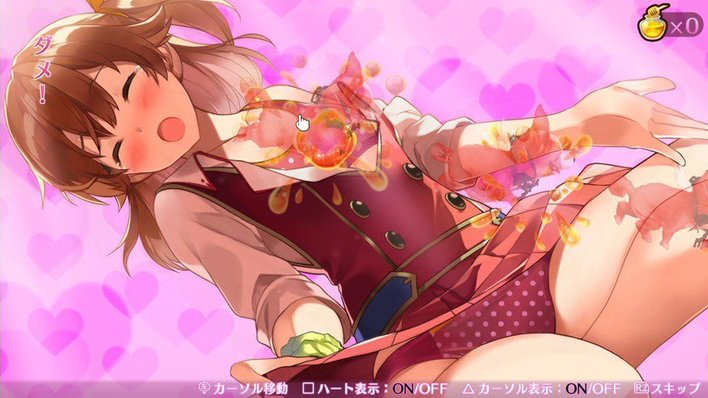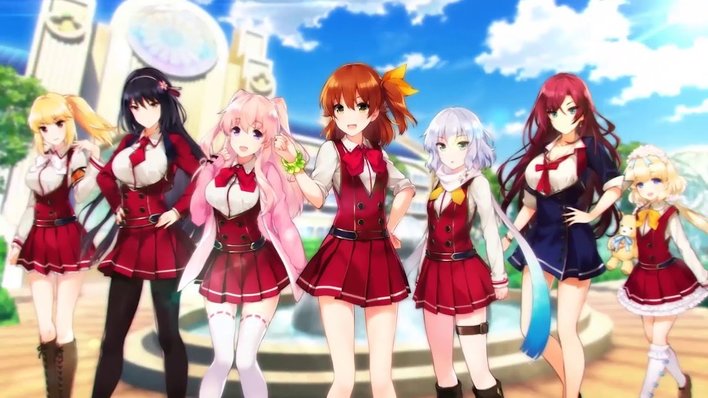In what is thankfully an incredibly rare move, the Video Standards Council, who are responsible for giving games PEGI age ratings in the UK, have refused to give an age rating to the upcoming PS Vita game Omega Labyrinth Z. As far as we can remember, this is actually the very first time the VSC have refused to give a game a UK Certificate of Classification since the PEGI system was first introduced - meaning the game has been banned from sale in the UK.
Something of a niche title to begin with, Omega Labyrinth Z, from specialist publisher pQube, is one of many Japanese "fan service" style games, with a focus on titillation and crude humour. Probably best described as being an "Ecchi" game - a word that's Japanese slang for things that get a bit sexy - Omega Labyrinth Z is set in the 'Anberyl Girls Academy' , where a group of students set out on a quest to find the academy's legendary holy grail, in the hope of using its powers to grant them a larger chest. A dungeon crawling role playing game at heart, it's a game with battles, monsters, experience points, and all the usual paraphernalia. And also, one heck of a lot of boobs.

One mini-game sees the characters covered in honey, which a small dog appears to lick off
The part the VSC had an issue with, however, was the title's mini-games. In between your dungeon crawling antics, you can choose to interact with a girl of your choosing in an innuendo fuelled mini-game. Letting you touch the girl's breasts, thighs, or pretty much anywhere else, it's up to you to find the right places to touch (as signalled by the character's protestations/affirmations), in order to trigger a "shame break", at which point a layer of her clothing will fall off. When fully "aroused", the mini-game will end, and the characters will level up. It's a system that's pretty common in these sort of fan-service style games (like the not-banned Criminal Girls), albeit one that does usually attract a fair amount of scrutiny from the ratings boards.
However, the thing that really seems to have given the VSC reason to pause is one particular character - Urara Rurikawa. Described in game as being a "first year" student, Urara is portrayed holding a teddy bear, and is somewhat less buxom than the rest of the characters - something which the VSC have interpreted as a sign that she's underage, which set all sorts of warning bells ringing. Not wanting to allow a game that could potentially be construed as normalising sexual contact with a child, the VSC have taken the practically unprecedented move of denying the game an age rating in the UK, meaning the game won't be allowed to be sold in shops.

That's Urara, on the right
While it's certainly easy to see where the VSC are coming from in saying that Urara certainly appears younger than the rest of the characters, fans have counter-argued that the issue isn't quite as cut and dry as you might think. Neither having a flatter chest, nor holding a teddy bear is a surefire sign that someone is either a child, or under age. As the game doesn't tell you what type of academy the girls are attending (is it a secondary school? College? Adult training?), and as far as we can tell, her age is never explicitly mentioned in game, there's no way of knowing for sure how old she is. Regardless, though, the character's appearance, and availability for the aforementioned mini-games, was reason enough for the VSC to ban the game from sale in the UK.
What's perhaps more confusing is that the same can't be said for anywhere else. Despite PEGI being a Europe wide rating system, the game has only been banned in the UK, Ireland, and Germany, but will be available freely everywhere else across Europe (and even the US). In this day and age, it seems bizarre that what could be classed as OK for one country could be deemed so inappropriate, it actually has to be banned in one of its neighbours, especially when we're all meant to be rating against the same system in Europe.
Equally unusual is the VSC's wording in its justification post on its blog. Declaring the grounds for its decision is "the likely harm being caused to a viewer or potential viewer, e.g. children or young people" by the game's content seems odd, considering that children and young people are most definitely not the intended audience for this game, and they'd actually be legally banned from playing it had they slapped a PEGI 18 on it. As the site goes on to say:
The VSC Rating Board believes this content in a game, which would have strong appeal to non-adult players, is an issue which would be unacceptable to the majority of UK consumers and, more importantly, has the potential to be significantly harmful in terms of the social and moral development of younger people in particular.
Which does raise the question - if the ratings board are concerned that children or young people might see content in a game that's rated a PEGI 18, why are other PEGI 18 games not similarly barred from sale, just in case they should slip into the hands of a child? There were many PEGI 18 games released last year that had "strong appeal to non-adult players" - like Call of Duty: WW2, for example - which contained content strong enough to warrant a PEGI 18, yet which weren't banned from sale, "just in case". To be clear, we're certainly not calling for more games to be banned - it just that it seems an unusual justification for a game that would have been essentially rated as "adults only".
In the VSC's defence, banning games from sale is an incredibly rare step for the council to take. Previous games that have been banned include Carmageddon - a game that rewarded you for running pedestrians over; Manhunt 2 - a literal murder simulator that challenged you to perform the most grizzly/torturous murders; and the infamous Rapelay, a game that, as you may guess from the title, was about raping women. Now, Omega Labyrinth Z can be added to that same infamous list.
We've reached out to publisher pQube and the VSC for comment, and will update as soon as we hear back.












